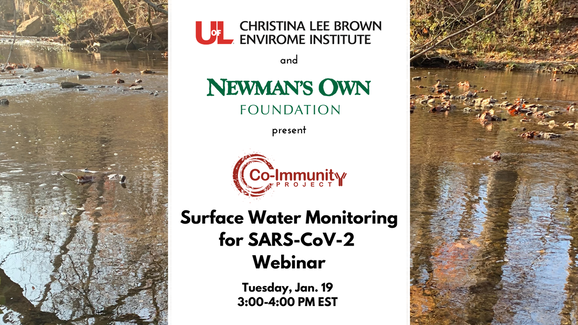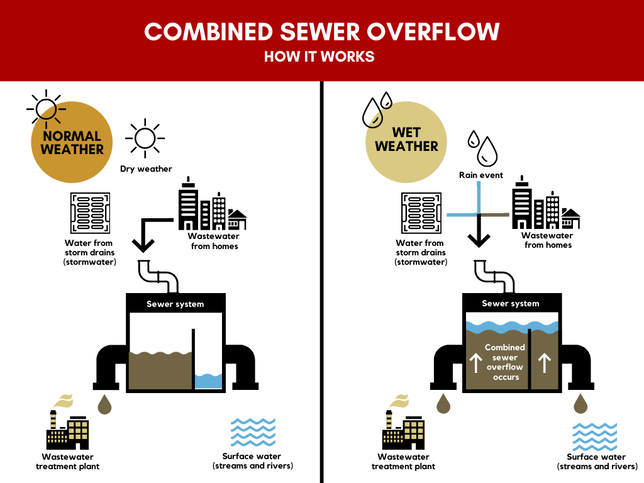What is the Co-Immunity Project?
In partnership with the Christina Lee Brown Envirome Institute, the Center for Predictive Medicine, and the University of Louisville, Kentucky Waterways Alliance is participating in the Co-Immunity Project, a multi-phase study to better understand the spread of SARS-CoV-2 virus, the virus that causes COVID-19, in Louisville. This research project has multiple phases including a healthcare worker study, wastewater-based epidemiology study, surface water study, and community study. KWA and other partners including Louisville Metropolitan Sewer District (MSD) are participating in the wastewater and surface water phase, where this week KWA started surface water sampling looking for the presence of SARS-CoV-2 virus in the Middle and South Forks of Beargrass Creek. More information on the Co-Immunity study can be found here.
Surface Water Study
Kentucky Waterways Alliance, in continuing its effort to advocate for and educate about clean and safe waterways, is focused on Phase 3 of the Co-Immunity Project. In this phase, University of Louisville’s Sustainability Director Dr. Tamara Sluss with masters student and KWA intern, Cullen Hunter, are testing for the presence of SARS-CoV-2 in surface water in our community.
Currently, KWA has areas of interest along Beargrass Creek because of their proximity to combined sewer overflows (CSOs) and areas of recreation. During heavy rains a CSO may occur as a result of water from storm drains (stormwater) and wastewater from the sewer system combining and spilling into local waterways such as Beargrass Creek. KWA hopes to learn more about how much, and if any SARS-CoV-2 is found in surface water near these CSOs. We are gathering information about the wastewater sewersheds overflowing into Beargrass Creek to better understand the risks associated with this novel virus and our waterways. As the project and sampling moves forward, KWA hopes to expand to more sites across the city.
While KWA is unsure of the risks that SARS-CoV-2 may cause for recreational activities associated with the waterways, sewer overflows still present other safety concerns such as fecal coliform bacteria, E. coli, and others. MSD monitors these overflows and issues advisories when the waterways are not safe for recreation. To learn more about KWA’s partnership with the Co-Immunity Project, visit this page. Keep an eye on this page for further information on the surface water study in the coming weeks.
In partnership with the Christina Lee Brown Envirome Institute, the Center for Predictive Medicine, and the University of Louisville, Kentucky Waterways Alliance is participating in the Co-Immunity Project, a multi-phase study to better understand the spread of SARS-CoV-2 virus, the virus that causes COVID-19, in Louisville. This research project has multiple phases including a healthcare worker study, wastewater-based epidemiology study, surface water study, and community study. KWA and other partners including Louisville Metropolitan Sewer District (MSD) are participating in the wastewater and surface water phase, where this week KWA started surface water sampling looking for the presence of SARS-CoV-2 virus in the Middle and South Forks of Beargrass Creek. More information on the Co-Immunity study can be found here.
Surface Water Study
Kentucky Waterways Alliance, in continuing its effort to advocate for and educate about clean and safe waterways, is focused on Phase 3 of the Co-Immunity Project. In this phase, University of Louisville’s Sustainability Director Dr. Tamara Sluss with masters student and KWA intern, Cullen Hunter, are testing for the presence of SARS-CoV-2 in surface water in our community.
Currently, KWA has areas of interest along Beargrass Creek because of their proximity to combined sewer overflows (CSOs) and areas of recreation. During heavy rains a CSO may occur as a result of water from storm drains (stormwater) and wastewater from the sewer system combining and spilling into local waterways such as Beargrass Creek. KWA hopes to learn more about how much, and if any SARS-CoV-2 is found in surface water near these CSOs. We are gathering information about the wastewater sewersheds overflowing into Beargrass Creek to better understand the risks associated with this novel virus and our waterways. As the project and sampling moves forward, KWA hopes to expand to more sites across the city.
While KWA is unsure of the risks that SARS-CoV-2 may cause for recreational activities associated with the waterways, sewer overflows still present other safety concerns such as fecal coliform bacteria, E. coli, and others. MSD monitors these overflows and issues advisories when the waterways are not safe for recreation. To learn more about KWA’s partnership with the Co-Immunity Project, visit this page. Keep an eye on this page for further information on the surface water study in the coming weeks.
Watch a recording of our January 19, 2021 webinar to get updated on this project.
|

